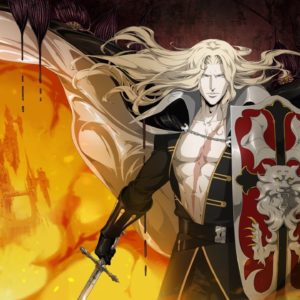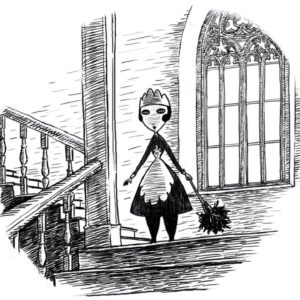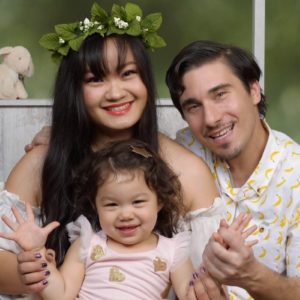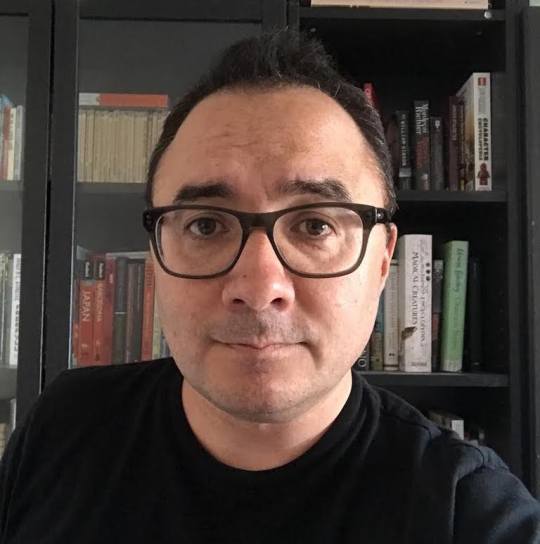
Sean Jara is a Toronto-based writer, producer, and story editor (Head Writer in Charge) and creator of the butt-kickin’, lady-driven new Nickelodeon and YTV series Mysticons. What you may not know is that for almost half a decade, Mysticons was in development with an all-male main cast! Sean gave us the low-down on becoming a successful TV writer, receiving constructive criticism from his 7-year-old, and the executive note that forever altered his career.
So, Mysticons is your original idea. When did you come up with it?
7 years ago. I was in a meeting and they asked me to pitch. I hadn’t expected that! So I just started talking about Dungeons & Dragons. The adventures I’d had with my friends as a dungeon master – which was really my first training in writing. And they were like, “Okay. Go home and write that!” From there it grew into an action show with 4 male leads who were based on my friends.
How long was the show in development with am all-boy main cast?
For 4 years. We wrote 12 episodes for the boy’s version and had an animatic done. Then they asked us to change it to a girl’s show.
Having done all that work, what was it like to have to make that change?
It was the worst and best note of my entire career. My initial reaction was, “WTF? We’re gonna have to re-do everything!?” It was also a very personal story, based on me and my friends – and we had invested tons of work into it. They told me on a Friday, so I had a weekend to cool off. On Monday, I looked at my bank account, then committed to doing it. But it was really about my daughter. Mysticons is for her and her generation. So that put a whole other spin on it. It energized me. I started thinking, “What would she like?”
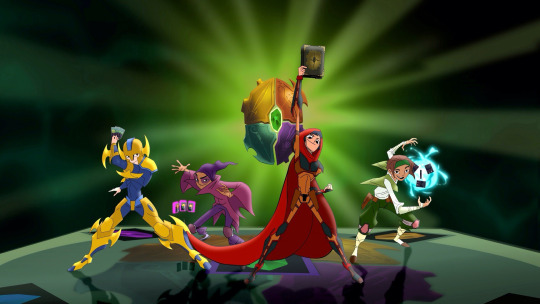
(The original 4 boy cast for Mysticons)
What changes did you make to the show?
Right off: the writing staff. When we switched to the girl’s version, I hired pretty much all women. In the room we talked about stories they thought they would have loved when they were 7 to 9 year old girls. We found those, dressed them up and made them fancy, and it was all good.
So the stories you had written did have to change quite a bit?
They did. Initially, the producers were like, “Can’t we just change the names and keep the 12 scripts?” And I was like “No, because a girl will react differently than a boy.” The characters and the world changed. Originally, it was set in the suburbs, with monsters coming to Earth. Changing to the girl version was an opportunity to go back to an earlier version of the show, which took place in a fantasy world. We did that because I think girls love going to other worlds. When I was working in a coffee shop in a bookstore, I remember watching a group of little girls run up to a fantasy table, and hearing them obsess over those worlds. So that was a big change. It also let me conceive of the girl’s show as a prequel to the boy’s. So if we ever wanted to do a spin-off, we could do the boy’s version, which takes place after the girl’s but on Earth.
How much did the character’s personalities change?
They were the same archetypes. The leader; the heart of the team; I think of everything in terms of The Wizard of Oz. The brain, the heart, the courage: everyone contributes something unique to the group. So they were the same archetypes as the boys, but they actually grew into more interesting characters to me. And then once the actors were cast, and they were taking our lines and saying them in ways that were infinitely better than how we’d heard them in our heads, that also strengthened the characters.
Why did you choose to switch to an almost-all-female writer’s room?
It felt more natural. I can approximate what a young girl thinks, but I haven’t lived it. When you want to dig into the details, you need someone there who’s actually lived that experience. And it was a great opportunity, because we had four main leads who were all girls, and all very different girls. Having written for a lot of action-adventure shows more focused on a boy audience, there’s always the One Girl. And because the one girl has to be every girl, she winds up becoming nothing. She can’t be too funny, or too dumb – because then that’s saying that girls are dumb. But there ARE dumb girls, just as there are dumb boys! But the token girl can’t be that. Suddenly, she has to be a role model. But with Mysticons – a cast of female leads – we got to reflect girls as they are.
Has writing Mysticons with girl leads influenced what you’ll write next?
Oh yeah. For action-adventure shows with 4 heroes, I’ll always push for 2 boys and 2 girls. And my writer’s room will always be about 60% women and 40% men. That’s just me: I do okay in all guy rooms, but they get very frat housey. I’m not a fratty guy. And I gotta say, the room was really efficient at Mysticons. We were in at 9, we’d shoot the shiz for like half an hour, then get into it. We’d be out by 4pm – very little time wasted. Writers came with office supplies. When the producers didn’t have notecards one day, a writer just had them in her bag. I’ve yet to meet the male writer who carries office supplies in his bag. The Mysticons room was seriously great.
When did you decide you wanted to be a writer?
I actually used to poo-poo writing. I went to University of Toronto and majored in Canadian-American relations and Spanish literature. But I fell into a film club called the Hart House Film Board. My friend had pitched an idea and been given $150 to produce a short. I was like, “I wanna do that!”. So I joined and got totally hooked. I wanted to be a director. At that point I thought writing was just, you tell a story, whatever – the least important part of the process. Now, I think it’s the most important part. Before the writing, you have nothing. Before the idea there’s nothing – and coming up with the idea is the hardest part.
How did you wind up becoming a writer then?
My views on writing changed when I met Larry Gelbart. I was a production coordinator on a show called Fast Track. The writing was behind, so Larry flew in from vacation in Paris to fix a script – as in, to write half of the script on the plane, just a couple days before shooting. We all got to shake his hand when he came in that Friday. He was so cool. That night I read the acts he’d written on the plane and couldn’t believe how good they were. Better than the stuff from the staff writers. That was when I first saw how powerful great writing is.
Later, I was working in the production office of Earth: Final Conflict. Things weren’t going well, they desperately needed writers, and my friend joked to the showrunner, “Sean writes!”. Half-joking, he was like, “Aargh, show me a script.” I took him seriously and wrote a sample over a weekend. He read it and asked me to pitch some ideas, so I did, and they bought one. That showrunner got canned two weeks later. I was lucky, because I wrote the writer’s contracts, so the minute he said, “You’re hired,” I fast-tracked my contract to the head of the Studio and got it signed. I wrote the outline and got a ‘story by’ credit, but didn’t get to write the script. It was still enough to get me an agent.
After that, you were a writer by profession?
Not yet. I left production for the Canadian Film Centre. I was in the second ever class of a 4 month long TV writing bootcamp they run. They bring in a showrunner who’s developing an idea and run it like a writer’s room. The showrunner gets free development work; the students get an experience that’s close as possible to the real deal. At the end, they all pitch the show together. One or two of those have actually made it onto TV. I got in with only one credit to my name, but it’s more competitive now. After that, I got pretty steady work.
What shows did you write for in that era – any highlights?
I did live action tween shows that were really fun. Once I started writing for animation, I wrote an episode for Ben 10; that was cool. Degrassi is probably the only show I was on that you guys know out here. I put words in Drake’s mouth before he was Drake! He was a sweet kid.
Wow! Back when he was at the bottom, and now he’s here. Then when did you become a story editor?
In 2007 I cut my teeth as head writer on a really small animated show called Urban Vermin. I hired a bunch of my friends from the Film Centre; it didn’t do great, but we had a blast working on it. And we learned on the job, because I made a lot of mistakes.
What sort of mistakes does a story editor make on his or her first show?
No one trains you to be a story editor! It’s things like not moving the story forward, not tightening things. Now I try to write as efficiently as possible. Get into the scene late as possible, and out of it fast as possible. And just needing to be funnier. To tell better jokes, and refresh old ones. When I started story editing, I was still finding my own voice. It’s a messy process!
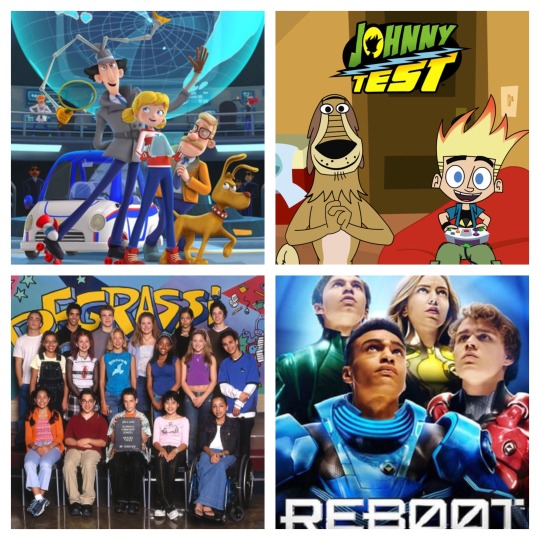
What was most instrumental in finding your own voice?
Writing my own material. I had been writing for existent shows or developing other people’s – which involves mimicking someone else’s voice and tone. It was only after many years of story-editing other people’s shows that I was able to distinguish my own voice. Mysticons was part of that process. Fantasy is my sweet spot; now it’s just figuring out the next stage.
What is your biggest advice for people who want to be writers?
Write a lot – that one’s obvious. But also practice pitching. Schools don’t emphasize it enough. But especially if you want to create your own shows, pitching is so important. Learning how to sell yourself, how to sell a show. Being able to boil it down to the important things and keep it simple enough that it sticks in people’s heads. Pitching is the worst part of the business – I hate it. But you have to get good at it, because 40% of development is selling a show. You sell it to one person at a time until you do your final big pitch with everyone in the room and you have to impress them and it’s exhausting and terrifying. But you gotta do it.
So you’re currently working on pitches for more animated series?
Yeah! There’s one, The Girl of La Mancha, that I really love. It stems from my being a longtime fan of Don Quixote. The big one now though is Broadswords. When I pitch it, it seems to be sticking with everybody. I was writing it just before you got here.
And Broadswords is another female-driven show, right?
Yeah: it’s basically the adult version of Mysticons. It’s all the crazy adult jokes that were inappropriate for the kid’s show. I was like, “We’ve gotta use these somehow!” and that gave me the idea for an adult version. Broad City, Zena… and so, Broadswords.
If Broadswords got greenlit, would you bring on Mysticons’ writers?
Oh, for sure. They came up with the jokes that inspired it, so I’d bring on as many as I could. Some of them are working, doing their own shows. A lot of them are poised to create their own shows. They were a great crew.
Last question: Is your daughter a huge fan of Mysticons?
She is! She’d watch every animatic with me. After her bedtime stories we’d watch them together. So she’s seen every single iteration of every episode, in every one of its stages. And it’s crazy – she has an incredible memory. She would be like, “What happened to the scene where Arkayna says this?”. And I’d be like, “Oh, we cut that out because it was too long so we changed it to this”. She basically got a film school education just over the last 2 years of me showing her all this stuff. She asks really good questions! It’s pretty cool.
So you wouldn’t be surprised if she went into film/TV, too?
I don’t know, we’ll see! If she likes it, then maybe. ❀
Follow Sean on Twitter.
Thanks for the interview Sean! We’ll be keeping up with you; can’t wait to see what you write next!
– Cooper ❀

